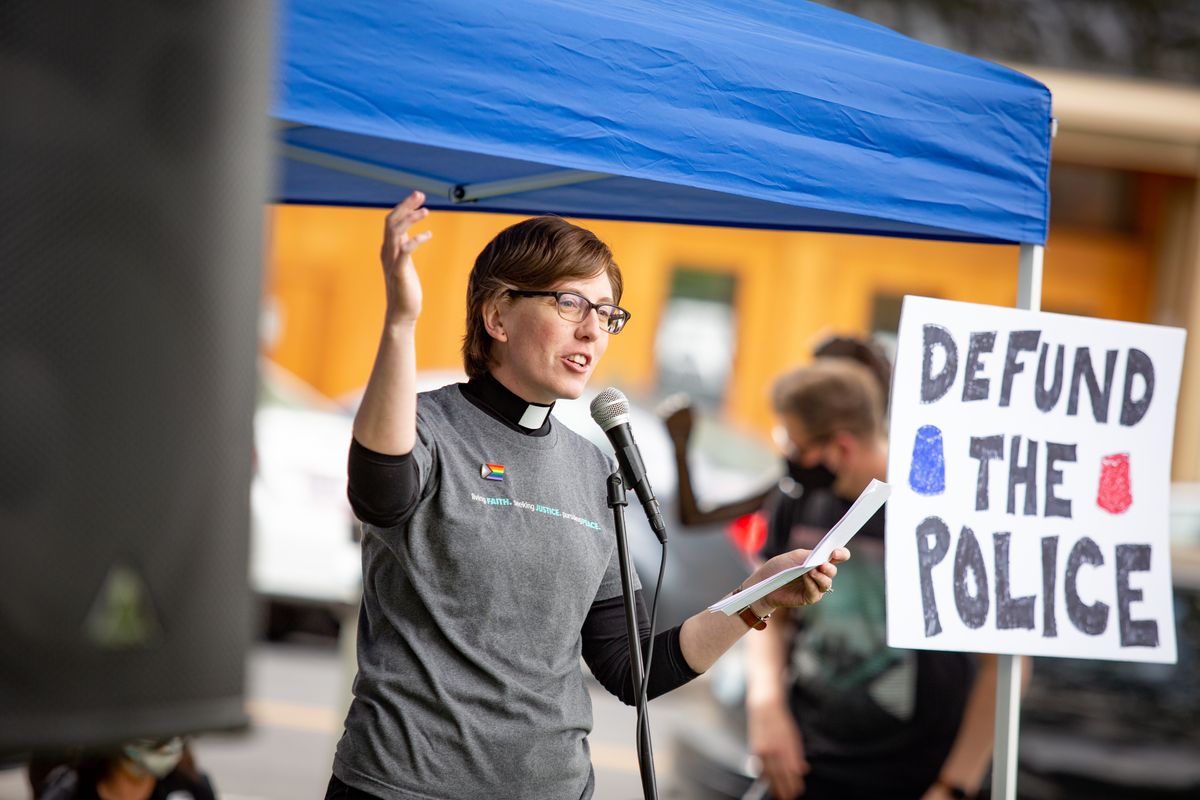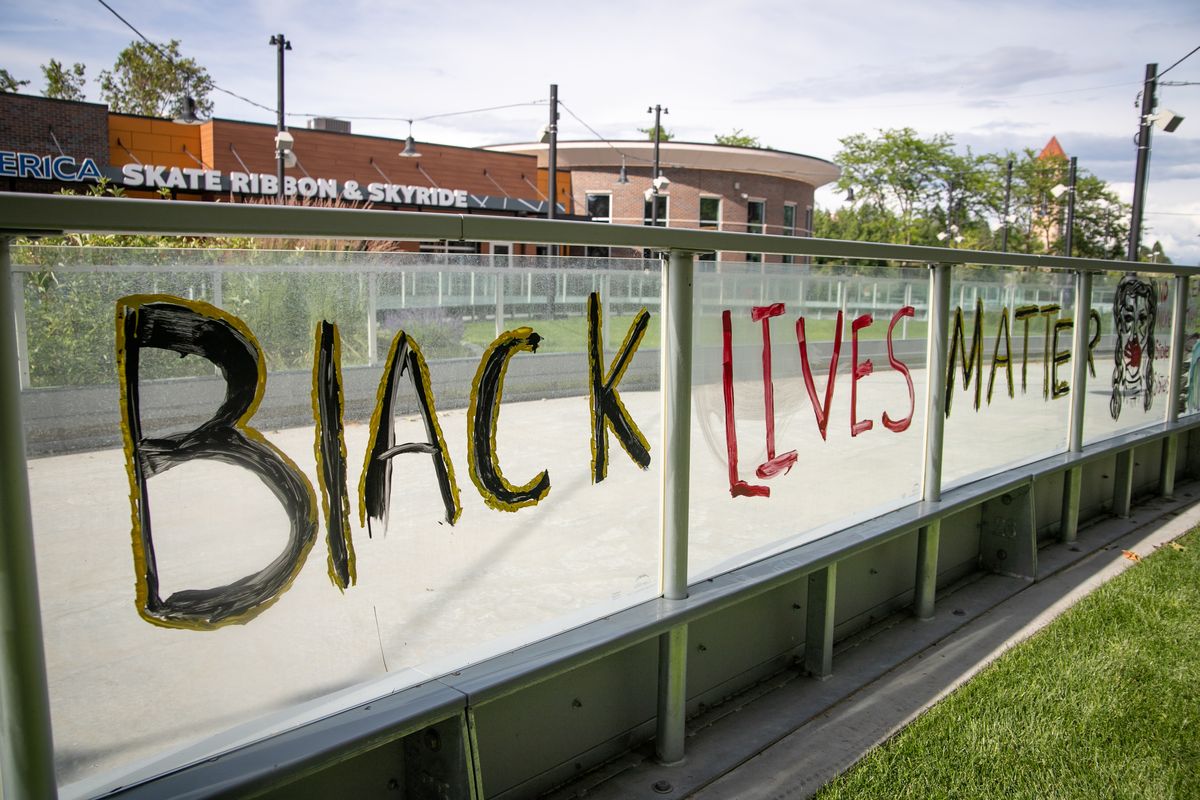Vigil held to remember people killed in law enforcement custody in Spokane

As the names of people killed in law enforcement custody were painted on the glass of the skate ribbon in Riverfront Park, people milled about ahead of the Candlelight Vigil to End Police Brutality on Sunday evening.
The event, organized by the Spectrum Center, was a chance to focus on the victims of police brutality in Spokane, said Lu Hill, Spectrum LGBTQ+ center board president.

The event was strategically held across from Spokane City Hall ahead of the City Council’s Monday vote on the police guild contract.
“As you know, the contract is voted on tomorrow. And it was really important for me to have a visual representation of our own police force acts of violence,” Hill said. “The reality is we have the fifth-deadliest police force in the nation, and they have killed our community members unnecessarily.”
Hill’s comment is based on the findings of the website Mapping Police Violence. The website, set up by advocates for police reform, ranks the nation’s 100 most populous cities by number of deaths that involved law enforcement, on a rate per 1 million people determined by number of residents.
Based on this calculation, Spokane ranked fifth with 15 law enforcement-involved deaths since 2013. Other cities on the list had far more incidents, but with much larger populations. Seattle Police Department has 23 deaths listed in the database.
The list of names on display in Spokane included Clando Anitok, a unarmed Marshallese man killed by a Spokane County Sheriff’s Deputy in January.The Anitok family planned to be represented in court by the Center for Justice before the nonprofit closed.
David Novak, a man who was banging a baseball bat on the hood of his truck during a dispute and was shot by police who mistook the sound for gunshots in January 2019, was also listed. The officer who shot Novak was cleared by Spokane County Prosecutor Larry Haskell last year; however, the Novak family filed a lawsuit shortly thereafter.
For Hill, reminding the community that police brutality happens in Spokane was an important part of the vigil.
“This is our city. This is happening in our backyards,” Hill said. “That’s why we need to worry about it.”
People milled about, chatting with organizers and fellow attendees. Some drew with chalk on the sidewalk.
Spokane Street Aid was present at the event, providing water, snacks, and first-aid kits. The group was informally started a few weeks ago and hopes to transform into a nonprofit that helps homeless and impoverished people in Spokane, said organizer Rebecca Daignault-Walker.
Many of the people experiencing homelessness in Spokane are people of color, Daignault-Walker said.
“Black Lives Matter is a multifaceted movement,” she said.
Not helping those who are struggling in the community “lacks empathy,” Daignault-Walker said.
She hopes to encourage homeless people to feel welcome at protests and demonstrations, which could help them connect to others who want to help.
While recent marches and protests have seen a drop in attendance after thousands of people participated in Spokane marches earlier this month, Daignault-Walker said it’s important to keep showing up.
“Keep reminding people that this isn’t done,” she said. “We still have work to do.”
Attendee Katy Taylor said the smaller crowd on Sunday made it possible for her to attend, since she falls into the high-risk category for COVID-19 and has been strictly observing social distancing regulations.
“You have to be hyper-vigilant,” Taylor said.
She has attended every march she could go to since moving to Spokane about five years ago. Taylor is active in the LGBTQ+ community and encourages her friends to attend events for other activist groups like Black Lives Matter.
“We all have to start showing up for each other’s stuff,” she said.
When one group gains civil rights, another isn’t far behind, Taylor said. As a single mother to four biracial children, she said, the Black Lives Matter movement is important in her daily life.
As the event continued, performers took the stage to sing, play an instrument or perform spoken word.
Eli Dyer, who plays music as Brotha Nature, performed a mixture of singing, computer-assisted live looping and spoken word Sunday evening. The audience sat on the grass watching as Dyer performed.
“It’s very powerful for me to play music like this,’ he said.
Dyer is a Spokane native who has been active in the music scene for the past six years. He plays his own unique style of organic hip-hop, spoken word and jazz. On Sunday he was live looping, recording himself beatboxing, playing the trumpet and singing, then layering the sounds on top of each other to create a song.
Dyer hoped his music would help bring a sense of unity to the gathering.
“It’s the feel that you make,” he said.
Katy Shedlock, pastor at Creators’ Table United Methodist Church, performed two pieces of spoken word. One was on her white privilege, the other focused on the funerals of people she knows who have been killed in law enforcement custody.
Attending local marches and protests has been important for Shedlock, who said the United Methodist theology “points us to justice.”
At each event, Shedlock said she has learned something new and hopes others do the same.
When it comes to being a clergy member at a protest, Shedlock said she hopes people see her presence as an affirmation that not only do Black Lives Matter, but they matter to God.
The vigil was a chance to engage in community healing, Shedlock said, something she often tries to facilitate at a funeral.
The event created space to heal, Hill said, and it also encouraged action. Hill told the crowd to call City Council members and ask them to vote “no” on the police guild contract on Monday. Spokane is a small city, she said, where 30 phone calls matter.
“Never again should there be an unnecessary death at the hands of a police officer, especially in Spokane.
“We are not a major city. We are not a violent city,” Hill said.
“There is no reason that our community members should be fearful that by calling 911, it could end in death.”